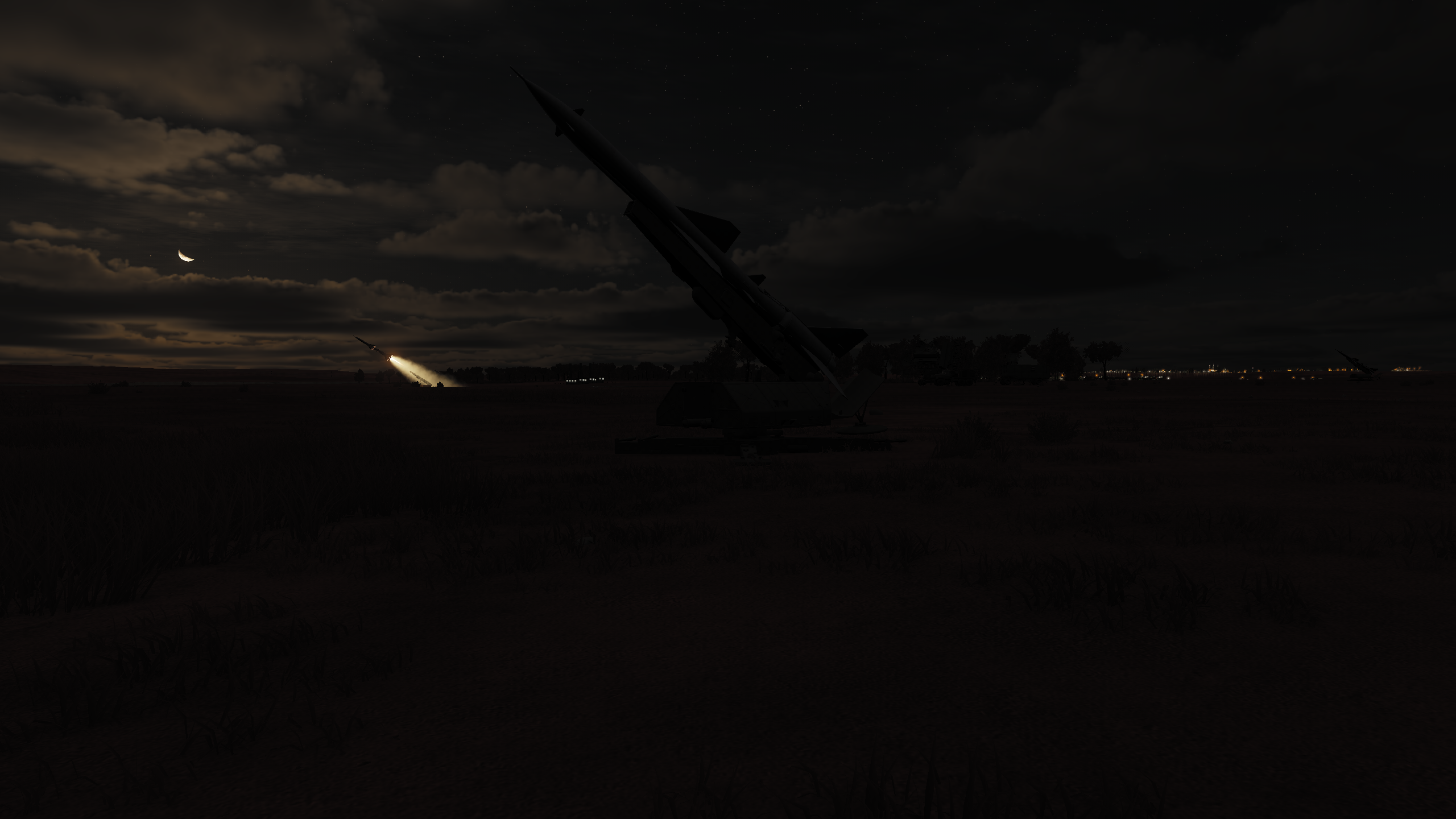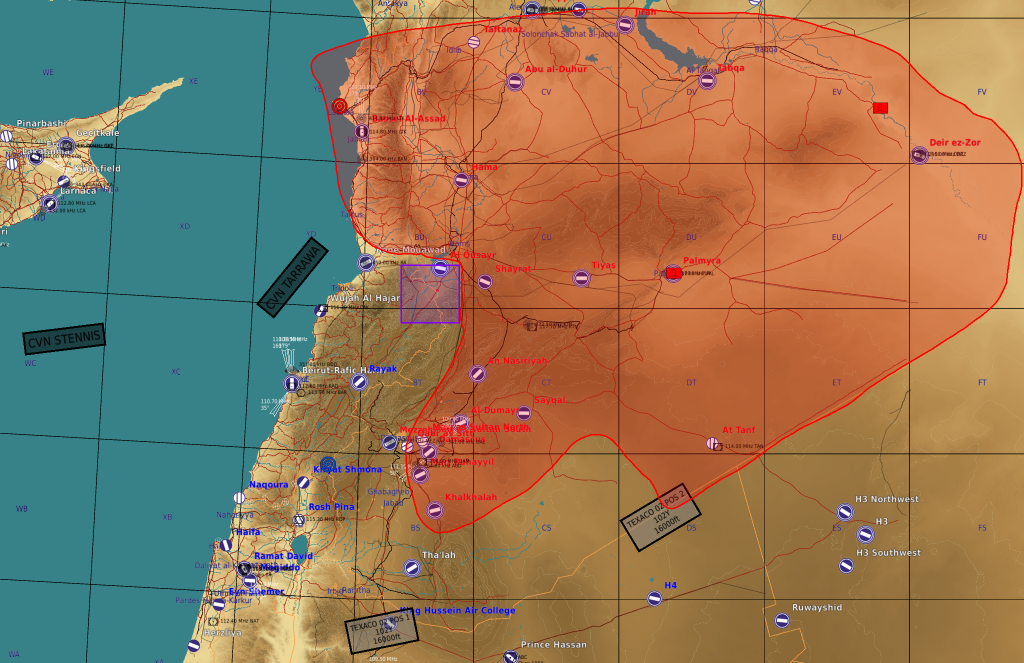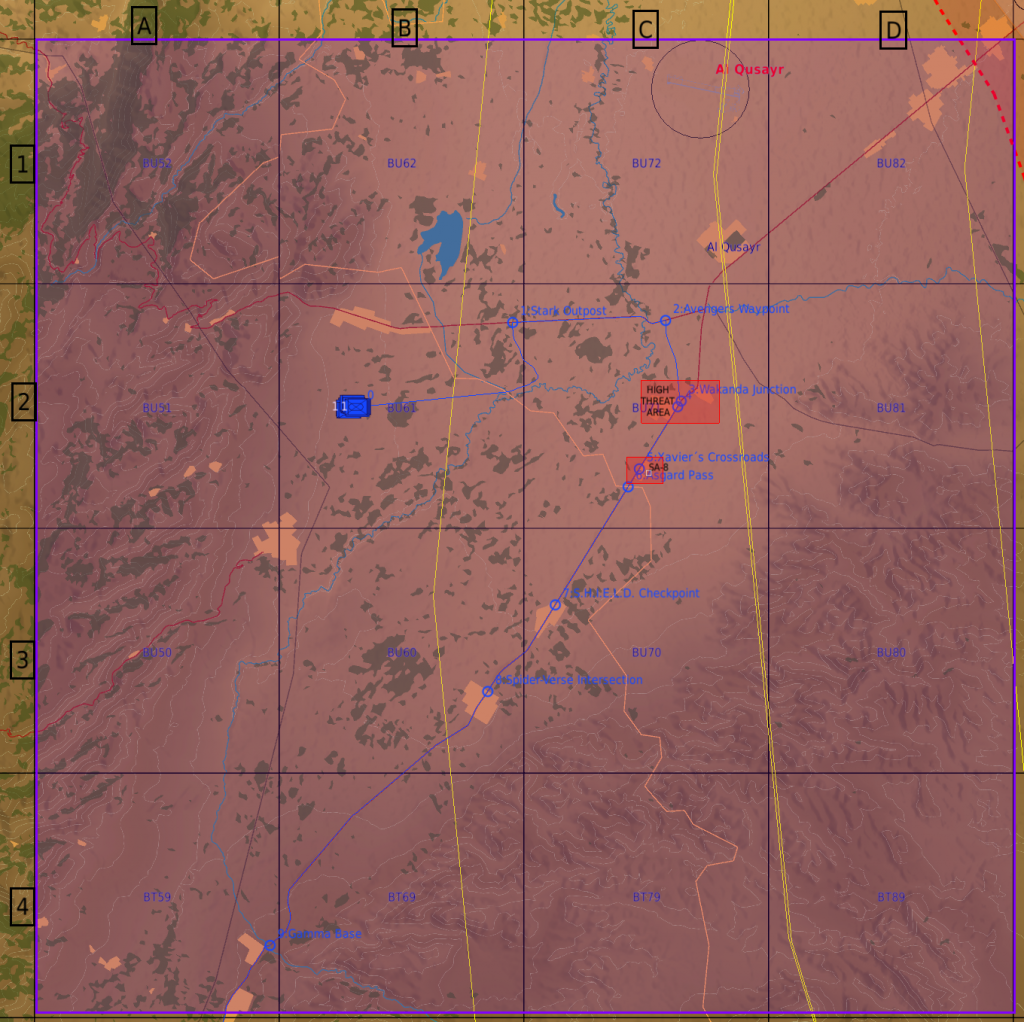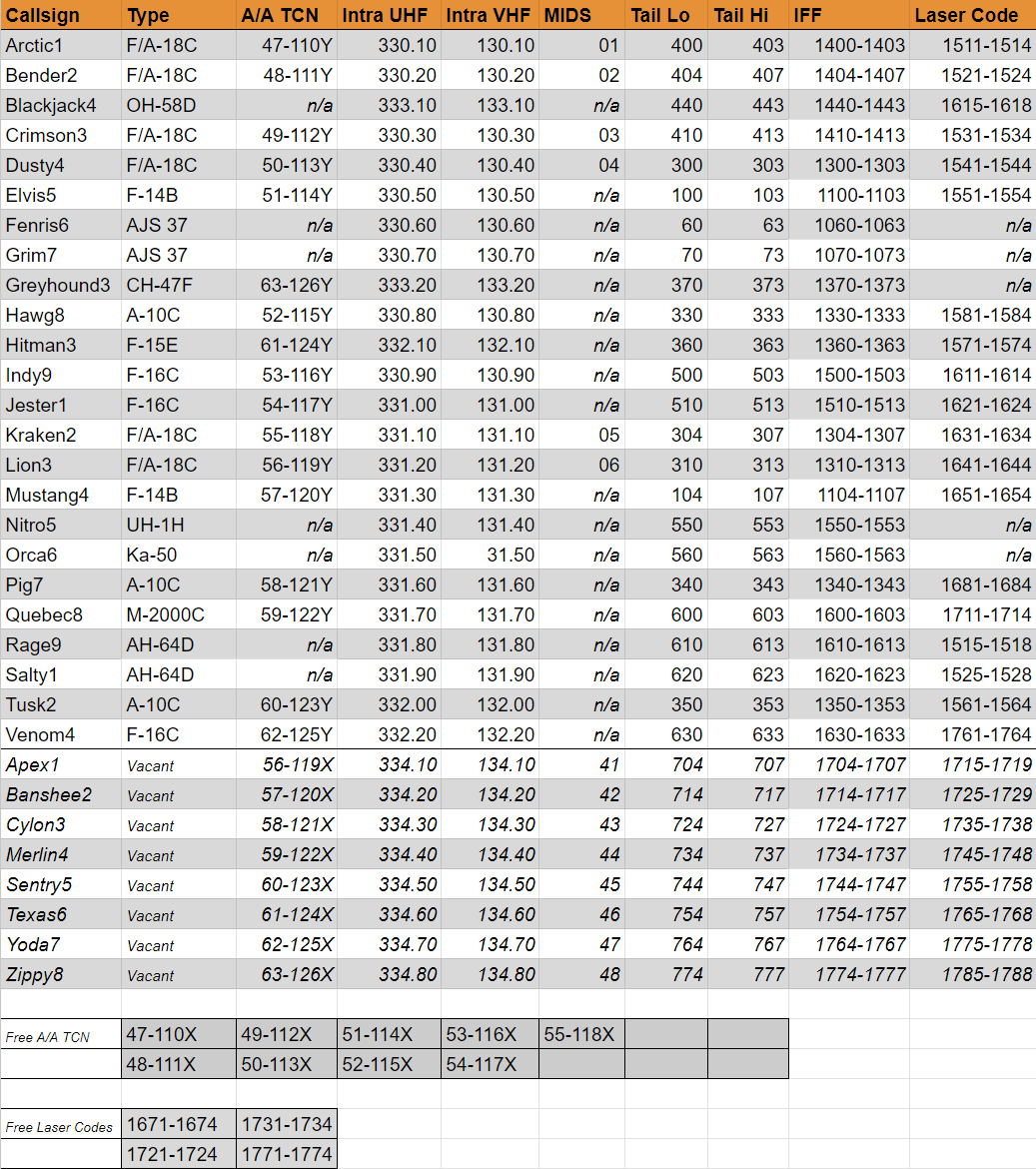
- This event has passed.
Operation Desert Fury
2024-03-14 @ 19:30 - 23:00

RSVP: 24 03 14 – 19:30 (please sign-up asap though, as it makes things easier to plan)
Activity: Mission – SEAD/DEAD, STRIKE, Air Interdiction, CAS
Theatre: Syria
Modules: F/A-18C, F-16C, F-15E, AJS 37, A-10C, AH-64, AV-8
Prerequisites: CASE 3, AAR, good system knowledge
LINEUP
F/A-18C ARCTIC11 (400): leka ARCTIC12 (401): Pita ARCTIC13 (402): Colanaktus ARCTIC14 (403): Mose
F/A-18C BENDER21 (404): Johnny BENDER22 (405): Jaeger BENDER23 (406): Frefeh BENDER24 (407): Kimkiller
F/A-18C CRIMSON31 (410): STRAFFAN CRIMSON32 (411): Enska CRIMSON33 (412): MC Blichten CRIMSON34 (413): Bouncer
F/A-18C DUSTY41 (300): DUSTY42 (301): DUSTY43 (302): DUSTY44 (303):
AJS 37 FENRIS61: FENRIS62: FENRIS63: FENRIS64:
AJS 37 GRIM71: GRIM72: GRIM73: GRIM74:
A-10C HAWG81: BigSwede HAWG82: Drsoos HAWG83: Kingtiger HAWG84:
F-16C INDY91: Moldy INDY92: Mink INDY93: Qvintus INDY94: Hofftari
F-16C JESTER11: Arco JESTER12: Pahi JESTER13: Mags JESTER14:
F/A-18C KRAKEN21 (304): KRAKEN22 (305): KRAKEN23 (306): KRAKEN24 (307):
F/A-18C LION31 (310): LION32 (311): LION33 (312): LION34 (313):
AH-64D RAGE91: BFQ / Shiggan RAGE92: Jackflash / Asken RAGE93: RAGE94:
AH-64D SALTY11: SALTY12: SALTY13: SALTY14:
A-10C PIG71: PIG72: PIG73: PIG74:
F-16C VENOM41: VENOM42: VENOM43: VENOM44:
F-15E HITMAN31: Nillefix / DeadGun HITMAN32: WeX / Agaton HITMAN33: Jazz / Troll HITMAN34:
F-15E CYLON51: CYLON52: CYLON53: CYLON54:
AV-8 YODA71: Jinx YODA72: Tony YODA73: YODA74:
AWACS STINGRAY: Knugen STINGRAY: Ulvar
Airport Ground: Tower: Control:
Carrier Marshal: Bankler Tower: Bankler LSO: Bankler
1 SITUATION
1.1 Overview
In the volatile geopolitical landscape surrounding the Middle East, tensions have escalated to a critical point. Intelligence reports from multiple sources confirm the existence of a clandestine nuclear facility nestled in the outskirts of Palmyra, Syria. This facility, believed to be under the control of a rogue faction with ties to extremist elements, poses an imminent threat to regional stability and global security.
The discovery of this nuclear facility has sent shockwaves through international diplomatic circles, prompting urgent action from coalition forces to neutralize the threat before it reaches catastrophic proportions. Codenamed “Operation Desert Fury,” a joint task force comprising air, ground, and special operations units has been assembled to execute a precision strike on the facility.
Located in a remote desert region, the facility is heavily fortified, protected by layers of anti-aircraft defenses and a network of hardened bunkers. Intelligence suggests that the facility is engaged in uranium enrichment and weaponization, raising concerns about the proliferation of nuclear capabilities into the hands of extremist groups.
With time of the essence, the coalition forces have mobilized assets from nearby airbases, including fighter jets, bombers, and reconnaissance aircraft. Special operations teams have been deployed to gather real-time intelligence and assess the enemy’s defenses, while ground units stand ready to provide support and secure the perimeter post-strike.
The success of Operation Desert Fury hinges on meticulous planning, seamless coordination, and the bravery of those tasked with executing the mission. Failure is not an option, as the consequences of allowing the nuclear facility to remain operational are too dire to contemplate. The clock is ticking, and the fate of the region hangs in the balance as coalition forces prepare to strike at the heart of darkness near Palmyra.
The F/A-18C Hornets, sleek and lethal, streak across the sky, their afterburners blazing as they spearhead the assault. Flying in tight formation with precision-guided munitions strapped beneath their wings, these multi-role fighters are poised to deliver a devastating blow to the enemy’s defenses.
Following closely behind, the F-16C Fighting Falcons, renowned for their agility and versatility, carve through the air with practiced expertise. Armed with an array of air-to-ground missiles and precision-guided bombs, they provide crucial close air support to suppress enemy anti-aircraft fire and neutralize ground threats.
Meanwhile, the F-15E Strike Eagles, known as the “Mudhens” for their ability to fly low and strike hard, soar overhead with a thunderous roar. These formidable aircraft, armed to the teeth with advanced targeting pods and standoff weaponry, loom large in the sky as they prepare to unleash hell upon the enemy’s fortified positions.
But it’s not just American firepower that fills the skies over Palmyra. The distinctive silhouette of the Viggen, Sweden’s rugged and reliable fighter-bomber, adds an international flavor to the coalition’s aerial armada. With its sophisticated avionics and precision-strike capabilities, the Viggen proves to be a valuable asset in the campaign to dismantle the enemy’s nuclear ambitions.
In the operational theater near the border between Syria and Beirut, the A-10 Thunderbolt IIs and AH-64 Apaches have been tasked with providing critical close air support (CAS) to coalition forces operating in the area, as well as covering a high-priority prisoner transport operation.
The Harrier aircraft have joined the mission to strike at an SA-8 threat that has been detected in the operational area where the AH-64 Apaches and A-10 Thunderbolt IIs are providing close air support (CAS) to coalition ground forces. With their vertical takeoff and landing capabilities, the Harriers offer unique advantages in conducting precision strikes against enemy air defense systems, such as the SA-8.
Equipped with a variety of air-to-ground munitions and advanced targeting systems, the Harriers are ideally suited to engage and neutralize the SA-8 threat from a variety of angles and altitudes. Their ability to operate in confined spaces and rapidly reposition makes them highly effective in engaging mobile and concealed targets, such as the SA-8 launcher.
Coordinating closely with the AH-64 Apaches and A-10 Thunderbolt IIs, the Harriers leverage their speed, agility, and versatility to deliver decisive blows to the SA-8 threat, clearing the way for unhindered CAS operations in the area. By neutralizing the enemy’s air defense capabilities, the Harriers ensure the safety and success of coalition ground forces engaged in critical missions along the border.
Furthermore, the presence of the Harriers demonstrates the coalition’s commitment to maintaining air superiority and eliminating threats to regional stability. Their rapid response and precision strike capabilities play a vital role in achieving mission objectives and safeguarding coalition forces operating in this dynamic and challenging environment.”
With the addition of the Harrier aircraft, the coalition’s air strike capabilities are further bolstered, enabling the neutralization of the SA-8 threat and ensuring the continued effectiveness of CAS operations in support of coalition ground forces.
1.2 Area of operations
The southern region of Syria is also characterized by a mix of urban centers, agricultural areas, and strategic infrastructure such as military bases and airfields. This diverse landscape requires a multifaceted approach to military operations, including both conventional and unconventional tactics tailored to the specific challenges of each environment.
1.3 Time and weather
METAR 20070905 2300Z
LLRD 06915KT 9999 SCT021 BKN075 SCT400 23/15 Q1033
* September 6 2007
* 01:00 local time
* Broken (7500′-11500′)
* Scattered/Broken (21000´)
* Scattered (40000´)
* Wind 69 / 15
* FORCE QNH 3051 / 1033
1.4 Air threats
With the Syrian Air Force severely depleted and only a handful of their MiG-29s deemed airworthy, the coalition planners factor in this intelligence into their mission strategy. Recognizing the limited air defense capability posed by the Syrian Air Force, the coalition’s air superiority is significantly less challenged.
However, they remain vigilant, understanding that even a few operational MiG-29s could pose a threat to the mission’s success. In response, additional measures are put in place to counter any potential aerial threats.
1.5 Ground threats
BMP-2, ZSU-23 Shilka, MANPADS, SA-10, SA-2, SA-6, SA-8, MANPADS
The presence of advanced surface-to-air missile (SAM) systems such as the SA-10 (S-300), SA-2 (S-75), and SA-6 (Kub) poses a significant challenge to the coalition’s mission to destroy the nuclear facility near Palmyra. Additionally, the threat of Shilka self-propelled anti-aircraft guns further complicates the air campaign.
SA-10 located at the Palmyra airbase and the SA-2 at the Nuclear facility
With the additional intelligence confirming the presence of an SA-10 at Abu al-Duhur and an SA-2 at Tal Siman, coalition commanders reassess the potential impact of these SAM sites on the mission to strike at the nuclear facility near Palmyra. After careful analysis, it is determined that these sites are unlikely to interfere with the primary mission objectives.
The SA-10 at Abu al-Duhur and the SA-2 at Tal Siman are located outside the operational area of the mission to strike at the nuclear facility. Their engagement ranges and altitudes do not intersect with the flight paths or target areas of the coalition’s strike aircraft, minimizing the risk to the mission.
1.6 Friendly forces
The offer of support from the Jordanian Air Force (JAF) to provide F-16A Fighting Falcons for protection of aerial refueling tankers and Airborne Warning and Control System (AWACS) aircraft at the border of Jordan is a valuable asset to the coalition’s mission.
The deployment of ground forces, including trucks, Humvees, and a Hawk battery, at the border between Syria and Beirut plays a crucial role in supporting the overall mission objectives and enhancing the security of the region.
1.7 Civilian/3rd part
Intel inaccessible at present. Standby for further directives.
2 MISSION
In a joint endeavor between the esteemed forces of the Air Force and Navy, we embark on a pivotal mission deep within enemy territory. Our unified goal: to eliminate the threat posed by the enemy’s nuclear weapons facility. This bastion of destruction must be eradicated to safeguard our nation’s security and ensure global stability.
3 EXECUTION
3.1 Commander’s intent
Destroy the nuclear enrichment facility
Suppress or destroy Syrian SAM-assets around Palmyra
Destroy the runways and targets of opportunity at Palmyra airbase
Provide close air support for the allied troops near the western border between Syria and Lebanon
3.2 Packages
The mission consists of three packages
Nightfire – AH64D, A-10C, AV8B
Reaper – F/A-18C
Shadowstrike – F15E, F-16C, AJS37
3.3 Order of events
01.00 Mission start
Nightfire take off ASAP
FL decides takeoff time for strike packages in order to meet TOT
02.20 Time on Target for pkg Reaper and Shadowstrike
02.35 RTB Reaper and Shadowstrike
02.50 RTB Nightfire
02.55 Marshal check-in for Case 3 recovery
3.4 Rules of Engagement
ROE: C
Pkg Reaper and Shadowstrike are expected to minimize civilian casualties in their target areas. EXCEPTION: Regarding the Nuclear enrichment facility, collateral damage is not a factor. Total destruction of that target takes priority.
As per SPINS
ALR: Medium
As per SPINS
3.6 Flight tasking
Package Nightfire:
Support allied troops near the western border with Beirut.
Contact JTFC callsign Starstruck on Ch 13 (269.00) when on route to area.
Primary objective: Protect the convoy carrying high value prisoners.
Secondary objective: Provide CAS for allied troops.
Package Reaper:
Primary objective: SEAD/DEAD vs SA-10 near Palmyra. Destroy main runway at Palmyra air base.
Secondary objective: Destroy taxiways at Palmyra air base and any targets of opportunity in the area, especially fighter aircraft on the ground.
This is a self-escorted strike. We have intel estimates of up to 8 MiG-29:s based at Palmyra. If alerted, they may scramble. It is imperative that you are not detected during ingress. While in Syrian airspace, remain low-level as long as possible. Coordinate A/A cover with package Shadowstrike.
Package Shadowstrike:
Primary objective: Destroy the nuclear enrichment facility near Deir es Zoor. There may be significant subterranean structures, choose munitions accordingly. BDA is mandatory.
Secondary objective: SEAD/DEAD vs SA-2 near the primary objective
This is a self-escorted strike. We have intel estimates of up to 8 MiG-29:s based at Palmyra. If alerted, they may scramble. It is imperative that you are not detected during ingress. While in Syrian airspace, remain low-level as long as possible. Coordinate A/A cover with package Reaper.
4 ADMINISTRATION AND LOGISTICS
4.1 Airfield operations
* Ramat David
* TCN: 84X
* Active runway: 09
* Departure via HAYIM
* Approach via ROPE PARK
Color
4.2 Carrier operations
* CASE 3
* BRC: 079
* FH: 070
* Departure time: 01:00
* Departure sequence:
* Charlie time: 02:55
As per Carrier Ops SPINS
4.3 Tankers
As per Aerial Refueling SOP
5 COMMAND AND CONTROL
5.1 Commander
* Mission commander is CRIMSON33
* Mission commander deputy is HITMAN31
5.2 Frequencies
As per Comms SOP
5.3 Authentication
RAMROD: SEXUALGIFT
As per Authentication SOP
5.4 Freq flow (Airfield flights)
7, 9, 3/5, 7
Remain on Tower (ch 7) during startup and departure. Go to Check in (ch 9). Expect Tactical (ch 3) or CAP A (ch 5). Use Tower (ch 7) for recovery.
5.5 Freq flow (Carrier flights)
1, 9, 3/5, 16, 1
Remain on Tower (ch 1) during startup and departure. Go to Check in (ch 9). Expect Tactical (ch 3) or CAP A (ch 5). Use Marshal (ch 16) and Tower (ch 1) for recovery.
5.6 Brevity
* TANGOUNIFORM – Mission declared successful
* NIGHTFALL – Abort mission
* HARVEST – SA-10 disabled
* SHOVEL – Runway disabled
* FALLOUT – Nuclear facility destroyed
* MARAUDER – SA-2 disabled
5.7 Bullseye
Intel inaccessible at present. Standby for further directives.


